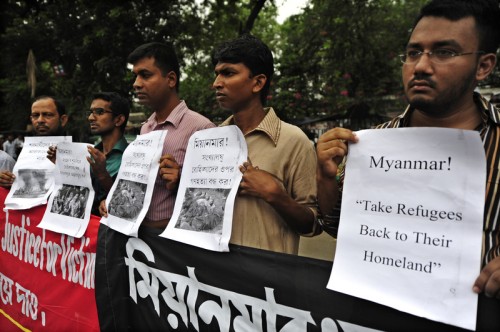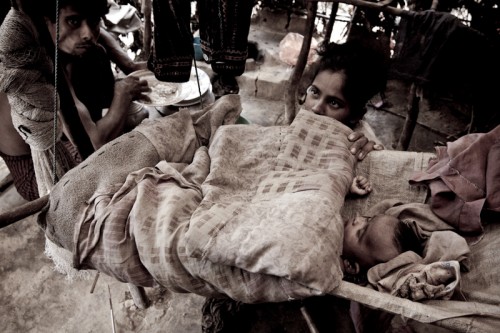This post is part of our special coverage Myanmar's Rohingya [1].
Besides India, Myanmar is the other country which shares a border with Bangladesh. People in the border areas share similar languages and religions. Recently, the Rohingyas of Myanmar started fleeing from their homes on boats because of local ethnic riots [2] in the Rakhine province and are now seeking refuge in neighboring Bangladesh; however, the government of Bangladesh is not letting them in [3], leaving them floating on the sea with their lives in peril.
After the severe ethnic riots the Rohingya minorities had no choice but to leave their villages to save their lives. They left everything behind and tried to enter Bangladesh through the porous borders. The land borders are not accessible easily, so they are using the waterways of the Naf river.
The Government of Bangladesh has taken a hard stance by reiterating that they are going to stop Rohingyas from trespassing. International human rights organization Human Rights Watch (HRW) recently requested Bangladesh to open the border for the Rohingyas.
The United Nation’s refugee related organization (UNHCR) made the same request, but the government of Bangladesh has stuck to its policy. As a consequence these poor refugees are floating on the sea in uncertain and dangerous conditions.
 [4]
[4]Members of the Protest Rohingya Initiative hold banners and images of those caught up in the violence. Image by Firoz Ahmed. Copyright Demotix.
According to local newspapers [5], 768 Rohingyas were arrested and sent back while trying to enter Bangladesh. But they could also not go back to Myanmar because death awaits them there. So they are floating in the ocean on small boats.
Nasiruddin Hozza [6] explains the position of the Bangladesh government and the realities for the Rohingyas:
Long ago Myanmar’s military regime declared that people from Arakan and rakhine state of present Myanmar are migrants from Bangladesh. For this reason if they cross over to Bangladesh, they will never be welcomed in Myanmar again. On the contrary, Mayanmar would find more grounds to name them as Bengali immigrants in the future. And this would clearly create more complications between these two countries.
Bangladesh, being an over-populated country, had given shelter to about half a million Rohingya refugees in 1978 who entered through Bangladesh border. The Myanmar government didn’t agree with this number quoted by Bangladesh government when some of them were repatriated later. So a large number of Rohingyas had to stay behind in Bangladesh, with no place to go. Now, the influx of more Rohingya refugees would definitely affect the social and economic conditions of the country.
More so there is rumor that the Islamic opposition party Jamat-e-islami is arming a section of the Rohingya refugees. So the government is strictly not in favor to let the Rohingya problems grow.
Here’s Nasiruddin Hojja explaining why the Rohingyas are interested in migrating to Bangladesh:
The Rohingya minorities in Myanmar are away from this politics and this is a case of their survival. An accusation against a Rohingya, that he raped a Rakhine lady, instigated attacks and counter-attacks in between Rakhine tribe and Rohingya tribe. That unleashed the hell [7] for the Bengali speaking Arakanese and the Muslim minorities in bordering states.
They are running away from home, because they know they need to save their lives. Leaving behind all their belongings they are trying to enter a country by boat, which isn’t their own, where no relatives live. It is quite a tough job to climb mountains and trek in the hilly roads to cross land borders, so they are simply sailing on a boat on the Naf river (which is on the border) trying to find a shelter in Bangladesh.
 [8]
[8]Thousands of unregistered Rohingya refugees, who have left behind the persecution they faced in Myanmar and who are now caught in a trap between Myanmar and Bangladesh, stateless, unregistered, without food and lacking work. Image by Rajibul Islam. Copyright Demotix
He writes, but their miseries are not ending anytime soon:
Though they are coming here by boat, they aren’t being able to dock in the quay. The Bangladesh Border Guards are blocking the way, who are bound to carry out their orders. They are actually serving them with food and water as much as they can and forcing them to drift towards the sea.
Even though the Bangladesh Government is against the Rohingya refugees because of political reasons, a huge part of the population is on the Rohingays side only for the sake of humanity.
Arif from Somewhereinblog [9] writes why people from Arakans are heading towards Bangladesh:
There is a riot going on in Myanmar between Buddhists and Muslims. The weak Buddhists are running away to different places for shelter, and the Muslims are not welcome in those places. Thus they are migrating to Bangladesh for shelter.
He thinks that rejecting those refugees is an act of inhumanity:
‘Bangladesh is unable to take the refugees inside the Border due to some problems’ the statement isn’t false at all. But do we lack that much mercy in our heart to point those people towards a definite death?
Anowar Hossain Farmer [10] wrote in his Facebook Page:
It is impossible to direct the Rohingya women and children towards death, if there is even a tiny bit of humanity in us. Everybody has the right for their lives, all over the world. Any civilized man can understand the fact.
We have to remember that, this is not a business matter, rather a duty from the call for humanity.
Many people believe that many Myanmar citizens are to blame for the miseries of the Rohingyas. So Tomdachi [11] suggested a solution that he came up with:
Though the riot was basically between Rohingyas and rakhines, the whole Myanmar population is siding with the rakhines. Some of my Burmese friends are putting up accusations against the Rohingyas in the internet. In their words, Rohingyas are Bangladeshis, and they are doing terrorism in Myanmar, they have burnt 20 rakhine villages so far and etc. On the other hand the Rohigyas are illiterate and disadvantaged. They don’t have anyone to take their side and fight back. So we should help them voice their opinions as much as possible.
A blogger name Amra Kather Dheki [12] posted two pictures and wrote on Somewherein blog:
Please see these two pictures. These were taken in different times and in different context but both the pictures are expressing the same language. An appeal for helping distress people: their eyes shows uncertainty, pain of losing everything, hunger is being reflected in their eyes..
The first picture was taken during the liberation war of Bangladesh (A baby is crying on it’s mother’s lap) and the second one was taken recently when many Rohingya people were driven away from their own country and they trespassed through the waterway to take refugee in the neighboring Bangladesh. Please compare those babies. Innocent, tired, hungry and then falling asleep.
cbnbd.com [13] provided a report on a Rohingya infant rescued from an abandoned boat:
BGB troops rescued one Rohingya infant on Wednesday at noon from an abandoned boat in Naf river. They handed over that devastated female child to a Bangladeshi family in Teknaf. The members of that family are looking after that infant and they informed that the infant is terribly sick and unfit.
This family is not only trying to save a child, but trying to save humanity from its extinction, and it is nessecery for this cruel world.
This post is part of our special coverage Myanmar's Rohingya [1].